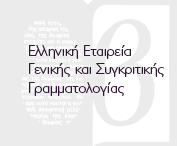Eutopia (?) and Personal Mythology: Interartistic relations and Reconstruction of intellectual tradition in USSR Russia of Andreas Embeirikos
The present paper focuses mainly on the extensive narrative poem USSR Russia (in Greek: Ες -Ες -Ες -Ερ Ρωσσία) by Andreas Embeiricos. It seeks to illuminate how different art forms are brought together in weaving the poem's narrative, language combining with visual imagery and Tsaikofsky’s music to «orchestrate» the poetic text. Another purpose of this paper is to trace the reconstruction of the intellectual tradition in this long programmatic poem. It highlights the intertextual connections between this poem and other related works by Embeiricos, such as «Amour-Amour», «I never forget Leo Tolstoy, my very first teacher», «The sight of Bogiati as a landscape in motion» (in Greek: «Αμούρ-Αμούρ», «Δεν λησμονώ ποτέ τον Λέοντα Τολστόϊ τον πρώτο δάσκαλό μου», «Το θέαμα του Μπογιατιού ως κινούμενου τοπίου») and other such poems in which Russia is rendered into myth. Hidden intertexts by political Palamas’ poetry The Wolves (in Greek: Οι Λύκοι), the poet's diary entries and interviews are examined in parallel, contributing to our understanding of his choice of intellectual forebears, pre-eminent among them being Leo Tolstoy at the head of the «resplendent triumvirate of Tolstoy, Freud, Breton», with the Russian novelist also included in the «saints of non-compliance», as a «heat-generating sun and cosmos, father of gods and men» in the poem «The Beati or The Saints of non-compliance», from the collection Octana (in Greek: «Οι Μπεάτοι ή της μη συμμορφώσεως οι άγιοι»).
(EL)
Eutopia (?) and Personal Mythology: Interartistic relations and Reconstruction of intellectual tradition in USSR Russia of Andreas Embeirikos
The present paper focuses mainly on the extensive narrative poem USSR Russia (in Greek: Ες - Ες -Ες -Ερ Ρωσσία) by Andreas Embiricos. It seeks to illuminate how different art forms are brought together in weaving the poem's narrative, language combining with visual imagery and Tsaikofsky’s music to «orchestrate» the poetic text. Another purpose of this paper is to trace the reconstruction of the intellectual tradition in this long programmatic poem. It highlights the intertextual connections between this poem and other related works by Embiricos, such as «Amour Amour», «I never forget Leo Tolstoy, my very first teacher», «The sight of Bogiati as a landscape in motion» (in Greek: «Αμούρ Αμούρ», «Δεν λησμονώ ποτέ τον Λέοντα Τολστόϊ τον πρώτο δάσκαλό μου», «Το θέαμα του Μπογιατιού ως κινούμενου τοπίου») and other such poems in which Russia is rendered into myth. Hidden intertexts by political Palamas’ poetry The Wolves (in Greek: Οι Λύκοι), the poet's diary entries and interviews are examined in parallel, contributing to our understanding of his choice of intellectual forebears, pre-eminent among them being Leo Tolstoy at the head of the «resplendent triumvirate of Tolstoy, Freud, Breton», with the Russian novelist also included in the «saints of non-compliance», as a «heat-generating sun and cosmos, father of gods and men» in the poem «The Beati or The Saints of non-compliance», from the collection Octana (in Greek: «Οι Μπεάτοι ή της μη συμμορφώσεως οι άγιοι»).
(EN)

